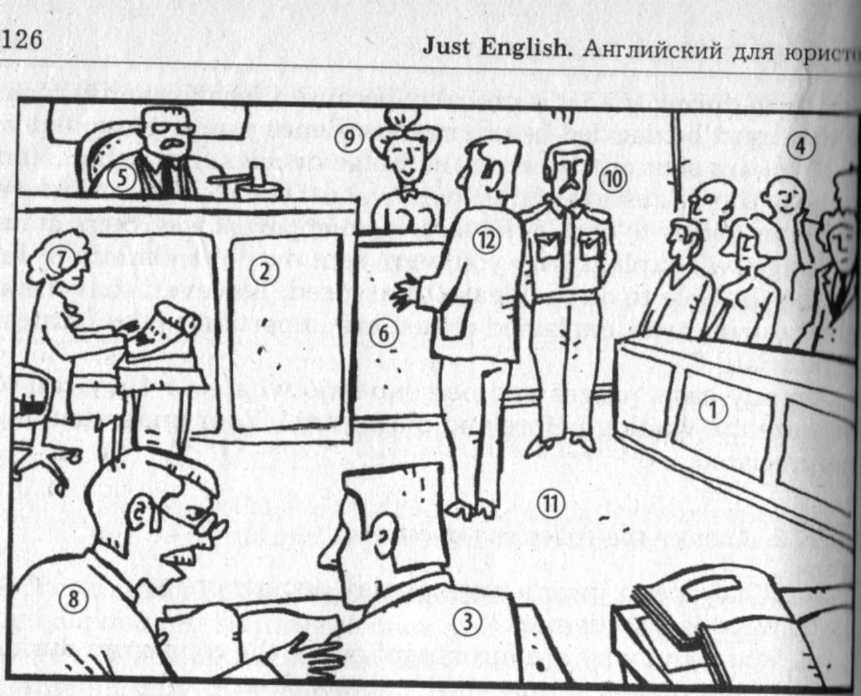
- •Заняття 30
- •Структура заняття:
- •2. Уведення в іншомовне середовище:
- •3. Перевірка домашнього завдання:
- •4. Повідомлення нової теми:
- •In the courtroom
- •5. Граматичний аспект заняття:
- •6. Підведення підсумків заняття.
- •7. Домашнє завдання. Роздатковий матеріал до заняття 30
- •1. Read the quotations and express your personal opinion about trials by jury.
- •2. Your Vocabulary:
- •3. Use the clues on the left to complete the words on the right. Use these words in the sentences or situations of your own:
- •4. Read the following text and write down Russian equivalent for the words and expressions in bold type:
- •In the courtroom
- •5. Answer the following questions:
- •6. Look at the picture of an American courtroom. Match the numbers in the picture with the words below:
- •7. Умовні речення ііі типу:
- •8. Translate the sentences from Ukrainian into English:
In the courtroom
The number of the days you work as a juror and your working hours depend on the jury selection system in the county in which you live. Regardless of the length of your working day, one thing that may strike you is the amount of waiting. For example, you may have to wait a long while before you are called for a jury panel. You also may be kept waiting in the jury room during trial while the judge and the lawyers settle a question of law that has come up.
Your having to wait before trial is important for the efficient operation of the system. Because there are many cases to be heard and because trials are expensive, judges encourage people to come to an agreement in their case before trial. These agreements, called settlements, can occur at any time, even a few minutes before the trial is scheduled to begin. This means that it is impossible to know exactly how many trials there will be on a particular day or when they will start.
In addition to the lawyers and the judge, three other people will play an important role in the trial. The court reporter, who sits close to the witnesses and the judge, puts down every word that is spoken during the trial and also may record the proceedings on tape. The clerk, who sits right below the judge, keeps track of all documents and exhibits and notes down important events in the trial. The bailiff helps to keep the trial running smoothly. The jury is in the custody of the bailiff, who sees to the jurors comfort and convenience and helps them if they are having any problems related to jury service.
Answer the following questions:
-
What does a juror's working day depend on?
-
What is a settlement?
Look at the picture of an American courtroom. Match the numbers in the picture with the words below:

-
jury G) witness stand
-
court reporter H) prosecuting attorney
-
judge I) bailiff
-
defendant J) jury box
-
defence attorney K) judge’s bench
-
witness L) courtroom
5. Граматичний аспект заняття:
Умовні речення ІІІ типу:
Якщо мова йдеться про щось, що вже відбулося, використовується ІІІ тип умовних речень:
Наприклад,
If I’d seen her, I would have asked her to call. (=I did not see her)
The books wouldn’t have been damaged if Mary had moved them. (="Mary" didn’t move them)
|
Type IІ
|
Частина речення з умовою If-clause |
Головна частина речення Main clause (result) |
Значення |
|
If + Past Perfect Unless (if not) |
|
Unreal Past |
|
|
had + V III ф.
|
would (’d)+ have+ V III ф. |
Впроава 1
1) Якби ти був уважніший, то не впав би (to fall-fell-fallen down). 2) Якби твій батько дав нам свою машину, ми б приїхали вчасно. 3) Якби сторони прийшли до згоди, судовий розгляд не відбувся б. 4) Я б не писав листа так довго, якби ти не відволікав мене. (to bother)
